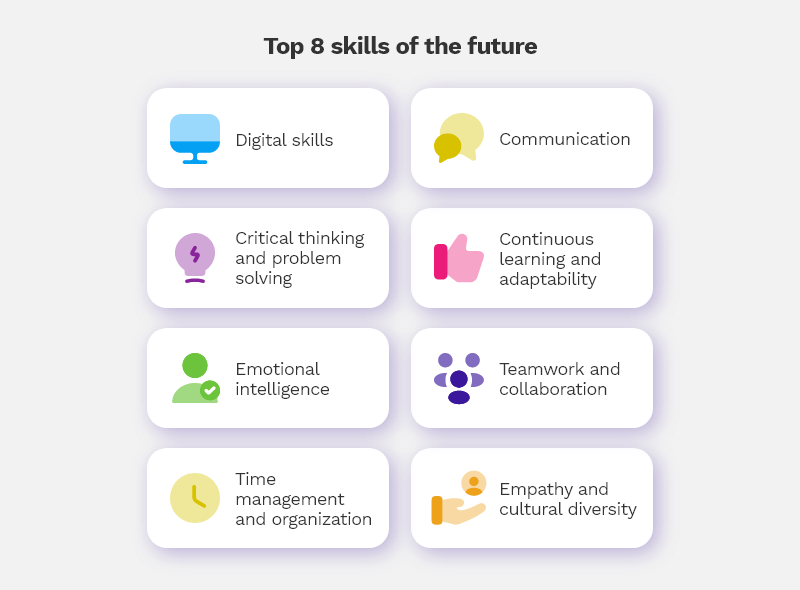Table of contents
ToggleIn a constantly evolving world of work, the acquisition and mastery of skills has become a crucial element for professional success. In fact, the “Leadership Vision for 2023” report by Gartner reveals that the number of skills required for a single job is consistently increasing by 5.4% annually.
This ongoing trend poses a significant challenge for professionals and businesses looking to stay competitive in today’s job market, where the ability to adapt and learn new skills has become essential. That’s why in this article we’ll be talking all about the skills of the future – their importance, which of them are key to professional success and, crucially, how to develop them.
The importance of skills of the future in today’s world of work
The Gartner report we just mentioned reveals that an incredible 33% of the skills that were needed for the average job posting in 2019 will no longer be required by 2024. This drastic change illustrates just how quickly the demands of the professional world are changing. In particular, a real threat is posed to those who do not keep up-to-date, as their skill-set may become obsolete in the near future.
Most will already know some of the causes of this unprecedented change, such as changing technology and the impact of COVID. However, what may be less clear is what the skills of the future will actually look like, and which of them will be essential.
According to McKinsey, as robotics, artificial intelligence and innovation take hold, cognitive, social and emotional skills will take on more weight and importance in the future. This is because employees who have these skills will be able to add value far beyond what any system or machine can do.
The top 8 skills of the future for professional success
1. Digital skills: Mastering technology
The professional world has been through a significant transition to digital in recent years. This has highlighted the need to develop digital skills that allow employees not only to adapt to new hybrid work methods, but also to online training.
Again, according to McKinsey, digital features such as automation or artificial intelligence are increasing the need to develop specific digital skills. The most relevant of these skills range from programming to data management, and, above all, the ability to understand and take advantage of technology. An employee capable of mastering technology and with the ability to quickly adapt to new digital tools and platforms is a more valuable asset than ever before for any modern company.
2. Communication skills: More important than ever
Effective communication naturally occupies an important place amongst the most in-demand skills of the future. This skill is defined as the ability to communicate effectively in person, in writing, and through digital media.
Clear and persuasive communication is essential in any industry, as is knowing how to express ideas and generate trust in other people.
3. Critical thinking and problem solving in a changing world
The ability to analyze situations, identify challenges and propose effective solutions is essential for any team. The same is true of problem solving. These skills allow professionals to streamline processes, make good decisions and prioritize, even in the face of difficulties in achieving objectives quickly.
4. Continuous learning and adaptability
The ability to continuously learn and adapt to change is a critical skill for professional success. Continuous learning involves constantly seeking opportunities to acquire new skills and knowledge. In a context where technology is advancing at a dizzying pace, adaptability represents a key competitive advantage, particularly for a team whose professionals are open to using new tools and technologies to stay relevant in the industry.
5. Emotional intelligence in the workplace
Emotional intelligence is the ability to understand and manage one’s own emotions as well as those of others. It is one of the most important skills of the future in any workplace, since an emotionally intelligent professional has an awareness of how their emotions influence their behavior and, furthermore, has the ability to connect and work successfully with different groups of people.
6. Teamwork and collaboration in a globalized world
Today, we work in a globalized professional environment, where it is common to collaborate with people from diverse cultures and with different perspectives. Teamwork and collaboration are skills that go beyond simply working well with others – they involve adapting to cultural diversity, communicating effectively on an international level, leading and following, and collaborating and solving problems in harmony with others.
7. Time management and organizational skills
Time management and organization are two essential skills for staying productive and achieving goals. These skills involve knowing how to prioritize tasks, set goals, efficiently manage time, and also delegate. Professional teams that master these critical skills of the future will be able to carry out projects successfully and stand out from the competition.
8. Empathy and cultural diversity in a multicultural world
Empathy and an understanding of cultural diversity are essential in a multicultural world. These skills help build strong relationships and foster more inclusive work environments. Empathy means being able to understand the emotional life of other people, even if one does not necessarily share the same opinions.
In modern and diverse corporate environments, it’s more important than ever to be empathetic in our interactions, and to place value on the ideas or proposals of other people. In this way, inclusivity and the acceptance of diversity will become a tangible reality.
Developing and acquiring the skills of the future
Acquiring and improving the skills essential for the jobs of the future is not a job for tomorrow, but rather a reality that is already knocking on our doors. These skills not only drive individual growth, but also strengthen work teams and help companies achieve real results. To enhance the skills of the future, companies and professionals can apply various strategies and methods:
Training and continuing education
Training and continuing education are key to staying up-to-date. Companies can offer both internal training programs and professional development plans to help with this. Furthermore, individuals can also seek learning opportunities such as online courses, workshops, seminars and certifications that improve their skills and knowledge in relevant areas.
Online learning resources and platforms
Online learning platforms have revolutionized the way people access learning resources today. They offer a wide range of courses and learning materials that allow users to learn at their own pace and from any location. Such resources offer great flexibility when it comes to acquiring new skills and knowledge.
Mentoring and peer learning
Mentoring and peer learning are methods that have always proven greatly effective in skill development. Mentoring allows more experienced individuals to guide – and share their experience with – less experienced professionals. Peer learning, on the other hand, involves collaboration between colleagues who share knowledge and skills, fostering a mutual learning environment in the workplace.
The importance of practical experience
Finally, it’s important to keep in mind that whilst theory is important, practical experience is essential in order to consolidate and apply any skills learned. To this end, companies can provide opportunities to carry out projects and teamwork in real, on-the-job situations. However, keep in mind that practical learning experiences can also be shaped through methods such as learning by doing.
How global trends impact the skills you need
Global trends and changes in the global economy have a significant impact on the skills required in the labor market. Two of the factors with the greatest influence on these evolving skills of the future are automation and technology, which have made programming or data analysis increasingly valuable abilities.
Globalization and diversity have also heightened the need for skills such as communication, teamwork and empathy. At the same time, developments in hybrid or remote work models have shown that skills such as time management and self-management are increasingly important.
As you can see, the skills needed to achieve professional success closely align with the changing demands of the professional world as well as the needs of companies. That’s why the acquisition of these skills through continuous training or online learning is key to the success of any organization.
At isEazy Skills, we want to make this whole process easier for you. How? By offering you the most complete catalog of soft skills courses on the market, allowing your team to acquire the crucial skills of the future. Our catalog is specially designed to cover any need, profile, position or sector, and is adapted to the very latest digital learning formulas. This ensures that your professionals will always learn through high-quality experiences and resources. With isEazy Skills, boosting your team’s talent has never been easier. What are you waiting for? Try it today!














